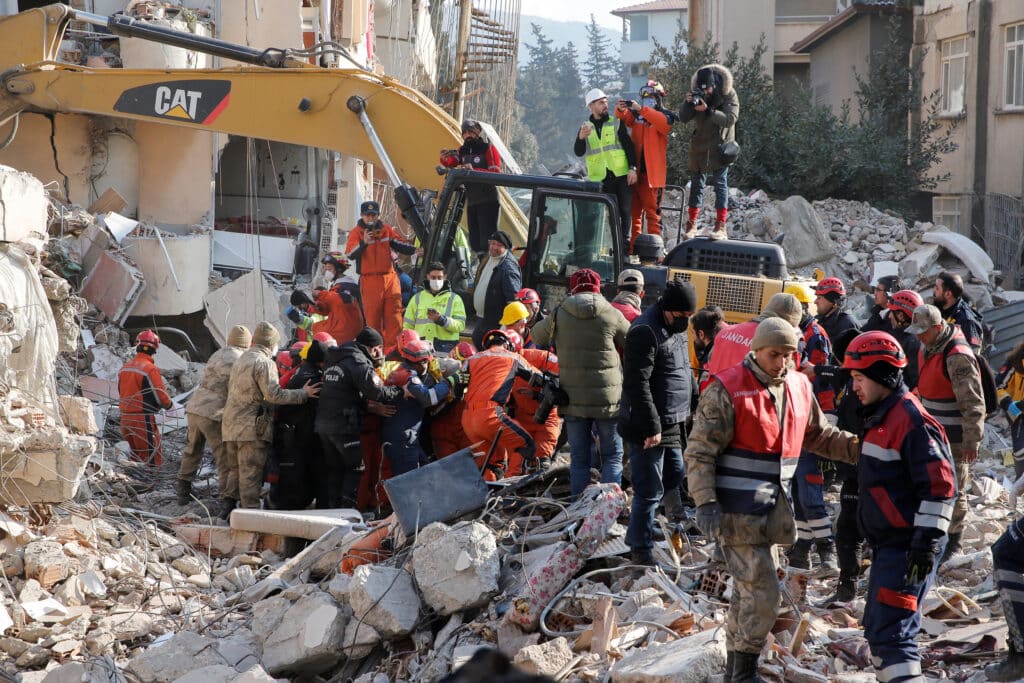The devastating earthquake to hit Turkey and Syria has fanned resentment among some Turks towards the millions of Syrian refugees in the country who are being blamed anecdotally by some for looting amid the destruction and chaos.
Several Turks in quake-hit towns and cities have accused Syrians of robbing damaged shops and homes. Anti-Syrian slogans such as “We don’t want Syrians,” “Immigrants should be deported,” and “No longer welcome” trended on Twitter.
Syrians left homeless by the earthquake said they had been kicked out of emergency camps and a Syrian man opened a shelter in the city of Mersin just for his compatriots after they had faced racist slurs.
“We stopped going to rescue sites to watch because people start screaming at us and pushing us around when they heard us speaking Arabic,” said a Syrian man, who didn’t want to be named. “People accuse us of looting all the time but that’s just to create discord.”
Turkey’s combined official death toll with Syria from the earthquake now stands at more than 37,000 and is predicted to rise further as hopes fade of finding many more survivors.
Hundreds of thousands have been left homeless and have waited for days in some areas for food and emergency shelter. Residents and aid workers have reported looting and several foreign aid teams briefly stopped work because of a deteriorating security situation.
Turkish authorities arrested 48 people for looting, the justice minister announced on Sunday, without saying where they were from. President Tayyip Erdogan has vowed to deal firmly with looters.
TENSIONS ON THE RISE
Turkey is home to nearly 4 million Syrian refugees, having opened its borders to those fleeing the civil war that erupted there in 2011. Many are concentrated in the south of the country close to the Syrian border. In the Turkish city of Gaziantep, badly hit by the earthquake, nearly half a million Syrians reside, making up a quarter of the population.
Resentment towards the Syrians is not new, but the earthquake has aggravated tensions.
Turkey has spent more than $40 billion since 2011 accommodating the refugees at a time of intense economic hardship in the country. Some Turks view Syrians as cheap labour taking over jobs and using services and the issue of Syrian refugees was set to be a major theme in this year’s presidential and parliamentary elections.
“Syrians walk around with their empty backpacks and fill them up from shops. There was a lot off looting here,” said Ahmet, a dentist sitting across from the rubble of what used to be his surgery.
Some offers of help on social media have been openly anti-Syrian.
“Quake survivors are welcome to stay in my Ankara home for a year, on condition that they are not Syrian,” said one tweet, with a picture of a wooden villa. Other offers of aid or temporary housing have set the same condition.
Syrian former opposition politician Mustafa Ali is running a makeshift shelter in Mersin for about 250 Syrians and says he agreed with local authorities to keep them apart from shelters for displaced Turks.
“There is a difference in culture, in the way of life, in the language, and this separation might resolve a lot of these problems,” he said.
“At first a lot of shelters didn’t ask people if they were Turkish or foreigners. But the next day, when there was some hassle and some racist commentary, we thought maybe some problems might come up that both they and we can do without.”
Among those staying at Ali’s shelter was Bilal Al-Sheikh, 35, who had fled the city of Iskenderun with his three children as the roof of their house collapsed.
“We were in a collective shelter and then stayed a day or two with some people and now we are here… At night the kids were sleeping and they came in and said you have to go to a different shelter… It’s been like this for a week, we have been suffering.”
Many Syrians initially considered Turkey as a stepping stone to a new life in Europe but then found themselves stuck after Turkey signed a deal with the European Union to halt the flow of migrants into Europe.
Some Syrians living without proper paperwork in Turkey and displaced by the earthquake said they are afraid to reach out to authorities for help, fearing it might expose them to possible deportation.
Turkish Foreign Minister Mevlut Cavusoglu said on Monday, “claims that there is a new influx of refugees from Syria to Turkey (after the earthquake) are not true. We will not allow that; it is out of question.”

